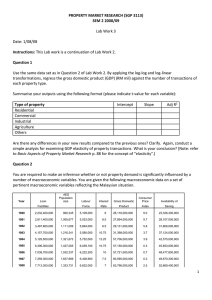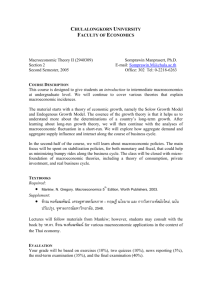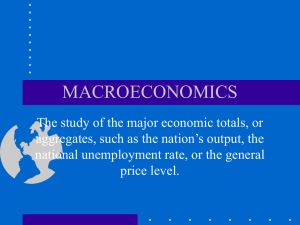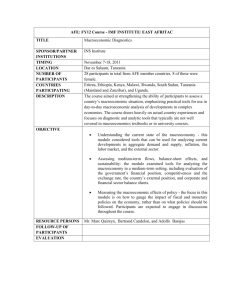Macroeconomics for development: from "financierism" to "productivism" Author: Ricardo Ffrench-Davis
advertisement
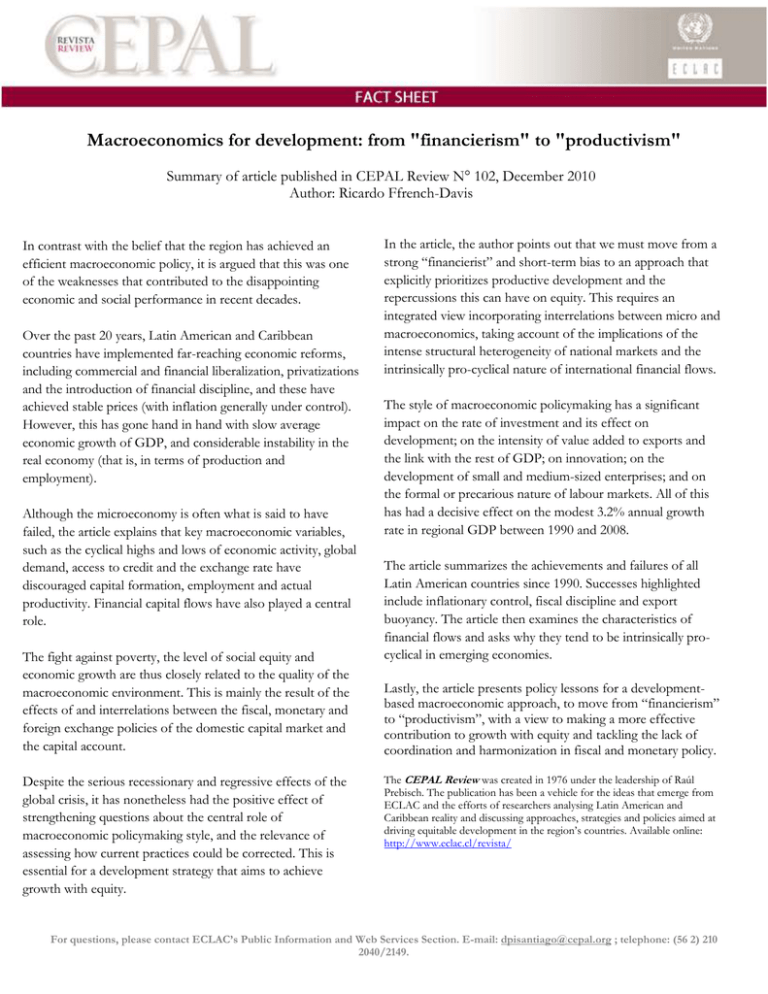
Macroeconomics for development: from "financierism" to "productivism" Summary of article published in CEPAL Review N° 102, December 2010 Author: Ricardo Ffrench-Davis In contrast with the belief that the region has achieved an efficient macroeconomic policy, it is argued that this was one of the weaknesses that contributed to the disappointing economic and social performance in recent decades. Over the past 20 years, Latin American and Caribbean countries have implemented far-reaching economic reforms, including commercial and financial liberalization, privatizations and the introduction of financial discipline, and these have achieved stable prices (with inflation generally under control). However, this has gone hand in hand with slow average economic growth of GDP, and considerable instability in the real economy (that is, in terms of production and employment). Although the microeconomy is often what is said to have failed, the article explains that key macroeconomic variables, such as the cyclical highs and lows of economic activity, global demand, access to credit and the exchange rate have discouraged capital formation, employment and actual productivity. Financial capital flows have also played a central role. The fight against poverty, the level of social equity and economic growth are thus closely related to the quality of the macroeconomic environment. This is mainly the result of the effects of and interrelations between the fiscal, monetary and foreign exchange policies of the domestic capital market and the capital account. Despite the serious recessionary and regressive effects of the global crisis, it has nonetheless had the positive effect of strengthening questions about the central role of macroeconomic policymaking style, and the relevance of assessing how current practices could be corrected. This is essential for a development strategy that aims to achieve growth with equity. In the article, the author points out that we must move from a strong “financierist” and short-term bias to an approach that explicitly prioritizes productive development and the repercussions this can have on equity. This requires an integrated view incorporating interrelations between micro and macroeconomics, taking account of the implications of the intense structural heterogeneity of national markets and the intrinsically pro-cyclical nature of international financial flows. The style of macroeconomic policymaking has a significant impact on the rate of investment and its effect on development; on the intensity of value added to exports and the link with the rest of GDP; on innovation; on the development of small and medium-sized enterprises; and on the formal or precarious nature of labour markets. All of this has had a decisive effect on the modest 3.2% annual growth rate in regional GDP between 1990 and 2008. The article summarizes the achievements and failures of all Latin American countries since 1990. Successes highlighted include inflationary control, fiscal discipline and export buoyancy. The article then examines the characteristics of financial flows and asks why they tend to be intrinsically procyclical in emerging economies. Lastly, the article presents policy lessons for a developmentbased macroeconomic approach, to move from “financierism” to “productivism”, with a view to making a more effective contribution to growth with equity and tackling the lack of coordination and harmonization in fiscal and monetary policy. The CEPAL Review was created in 1976 under the leadership of Raúl Prebisch. The publication has been a vehicle for the ideas that emerge from ECLAC and the efforts of researchers analysing Latin American and Caribbean reality and discussing approaches, strategies and policies aimed at driving equitable development in the region’s countries. Available online: http://www.eclac.cl/revista/ For questions, please contact ECLAC’s Public Information and Web Services Section. E-mail: dpisantiago@cepal.org ; telephone: (56 2) 210 2040/2149.
